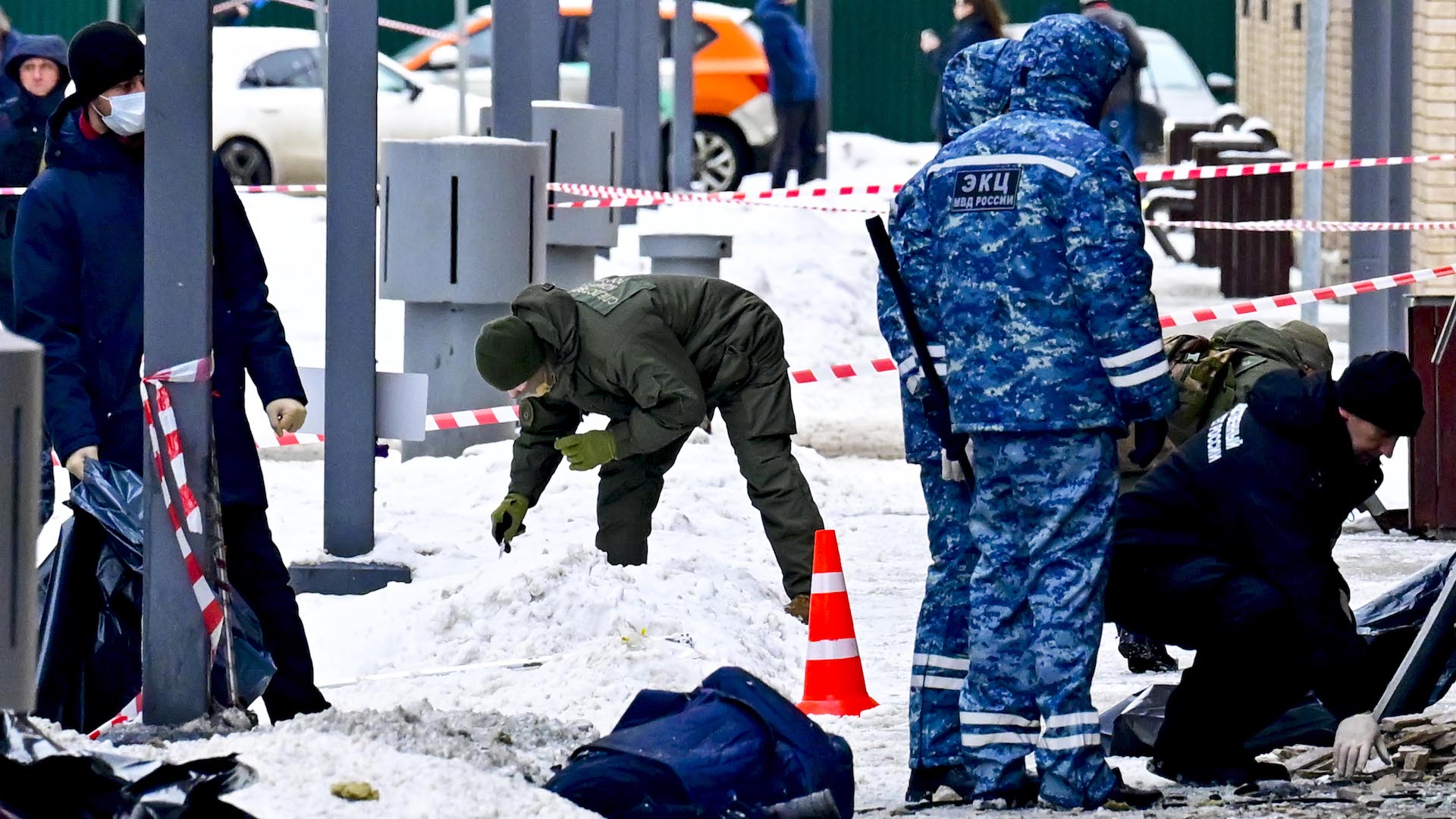The Security Service of Ukraine (SBU) has claimed responsibility for the assassination of a Russian general, the most high-profile killing of its kind since the start of the Kremlin’s full-scale invasion of Ukraine. Lt. Gen. Igor Kirillov, commander of Russia’s radiation, chemical, and biological defense troops, known as the RKhBZ, was killed in an explosion, along with his assistant, in Moscow early this morning, a day after Ukrainian state prosecutors charged him in absentia with the alleged use of banned chemical weapons.
Sources within the SBU told various news agencies that the killings were a “special operation” by the organization. “The liquidation of Lt. Gen. Igor Kirillov, chief of the Russian Armed Forces’ radiation, chemical, and biological defense troops is a special operation by the SBU,” one source told AFP.
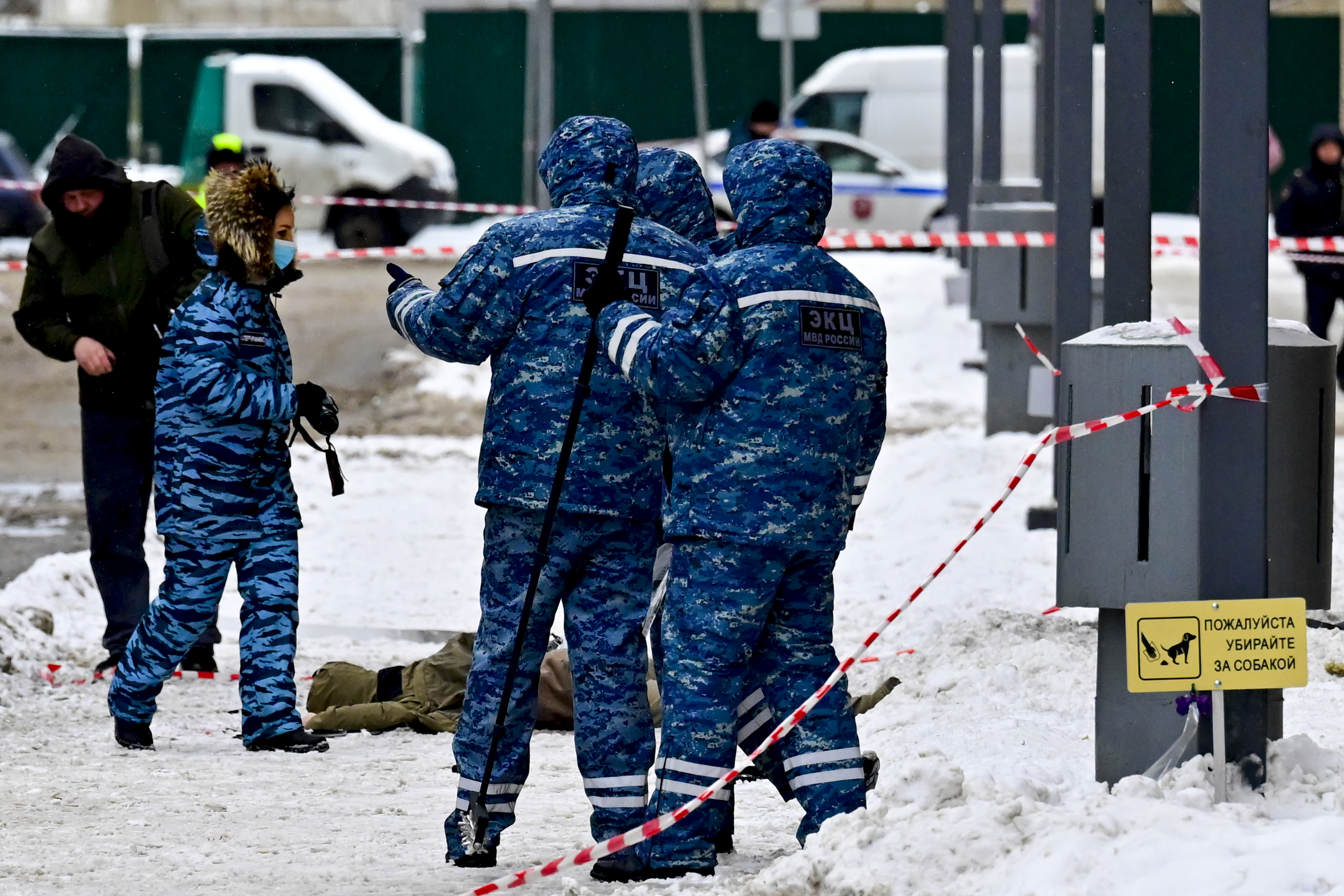
Other unnamed sources in Kyiv also told The Guardian newspaper that the SBU was behind the killings. “We were involved in the operation,” the source said.
Kirillov and his assistant were killed outside a Moscow apartment, when a bomb hidden in an electric scooter went off, according to Russia’s Investigative Committee, which probes serious crimes.
It appears that the explosives were detonated remotely as the two individuals entered a house on Moscow’s Ryazansky Prospekt, around four miles southeast of the Kremlin.
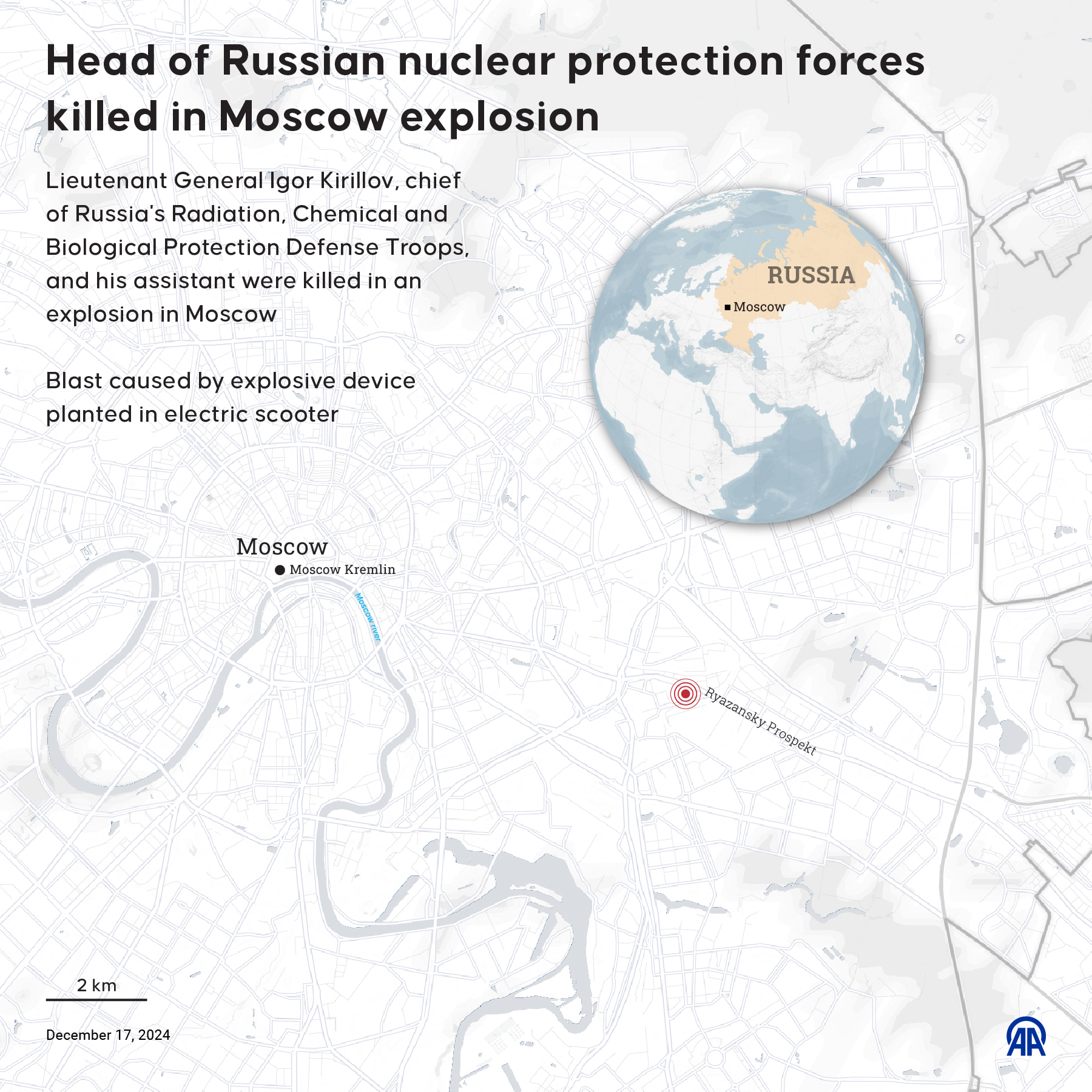
Footage posted to social media, including a video apparently captured by the dashcam of a nearby car, shows two men exiting the apartment followed immediately by a large explosion.
Photos from the aftermath of the blast show the charred remains of an e-scooter outside the shattered entrance to an apartment building.
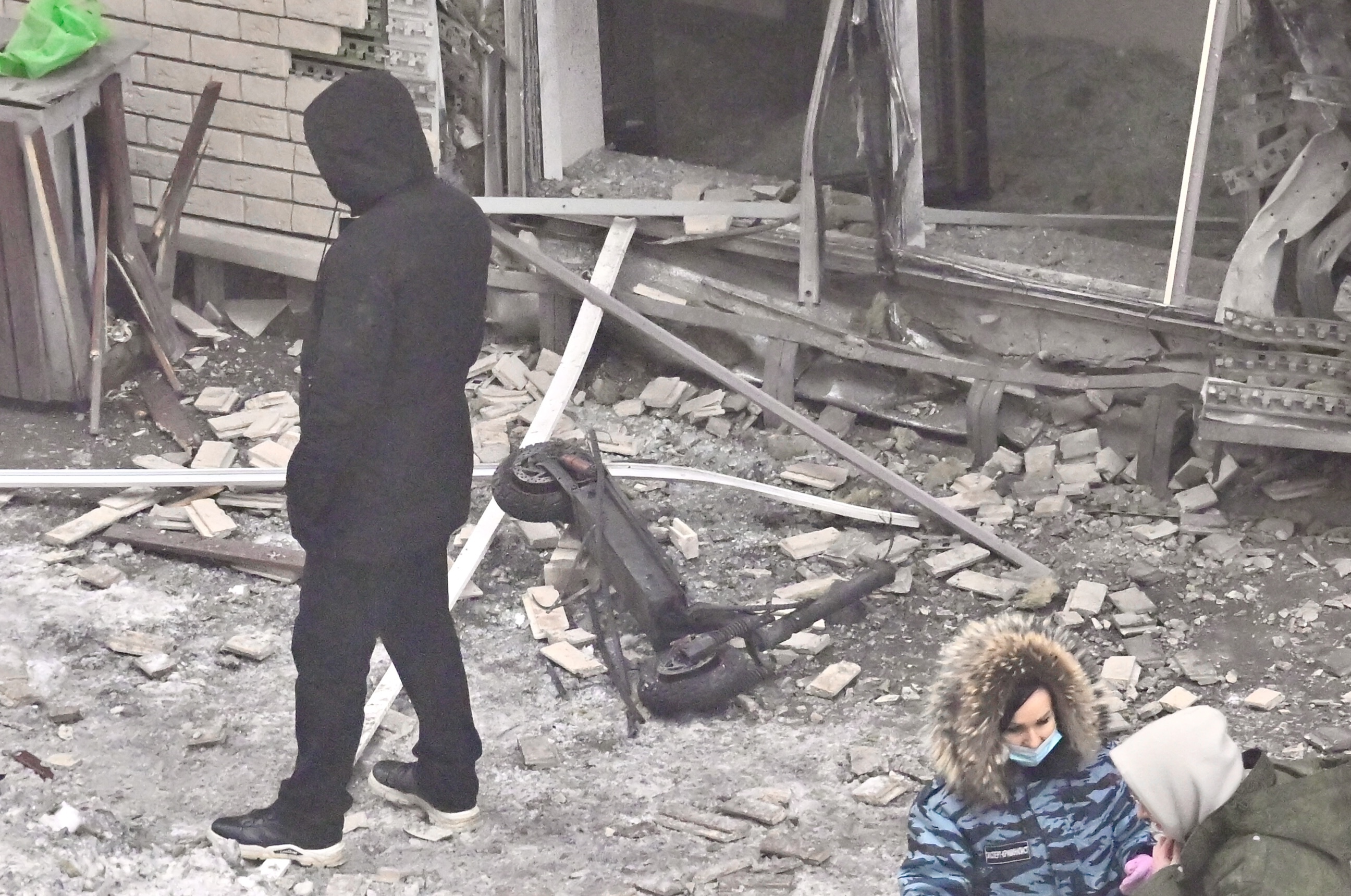
One uniformed body was seen lying face-down in the snow outside the building, with another body partly concealed by black plastic sheets.
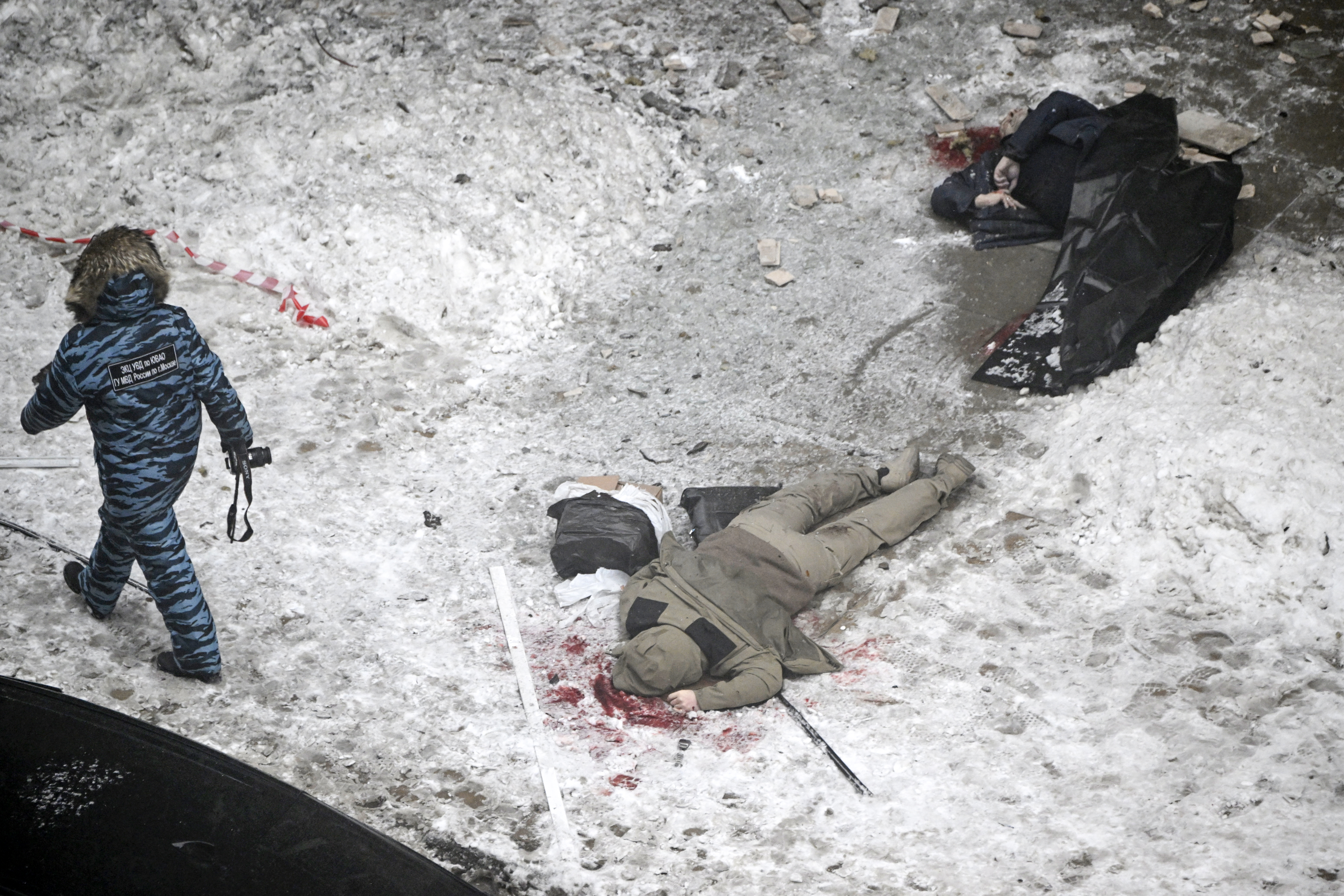
Russian investigators say they have launched a criminal case into the killings, which are likely to be treated as terrorism, according to Russian law enforcement sources.
Kirillov had been listed on the Ukrainian Myrotvorets (Peacemaker) website, an unofficial database of people considered to be enemies of the country. As of this morning, a photograph of Kirillov on the website had the word “Liquidated” overwritten in red letters.
While other senior members of the Russian Armed Forces as well as civic and industry leaders, and pro-Kremlin figures, have been targeted in assassination attempts, especially in Crimea and Russian-occupied areas elsewhere in Ukraine, this incident is especially notable.
Not only was Kirillov, who was 54, the most senior Russian military officer to be assassinated inside Russia by Ukraine, but authorities in Kyiv immediately claimed responsibility for the action. Previously, such targeted killings have often been left unclaimed.
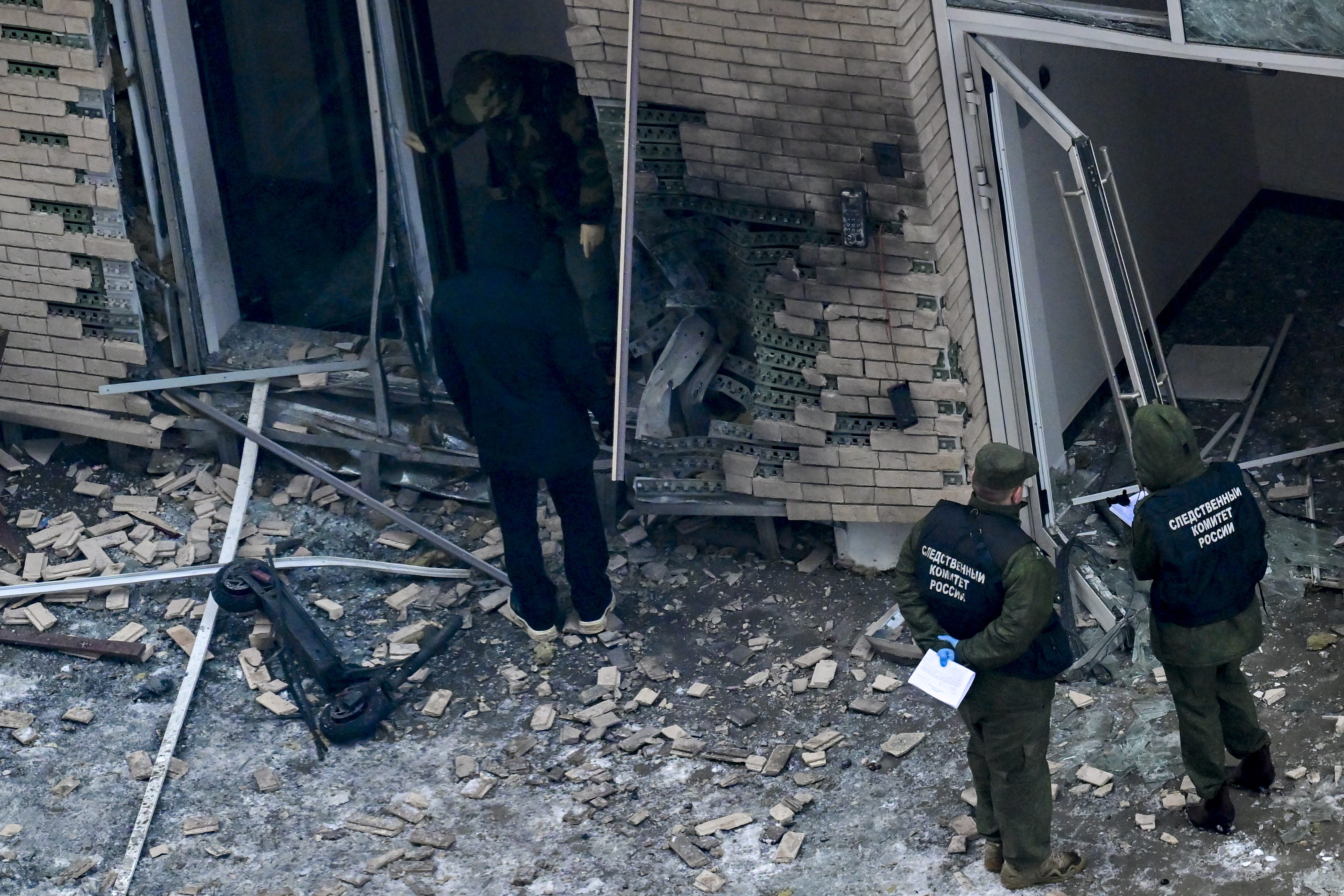
Former Russian president Dmitry Medvedev, now deputy chairman of Russia’s Security Council, has said Moscow will avenge the killing, threatening Ukraine’s military and political leadership with an unspecified imminent response, according to the state-run RIA news agency.
“Realizing the inevitability of its military defeat, [Ukraine] launches cowardly and despicable strikes in peaceful cities,” Medvedev added, according to RIA.
As for the RKhBZ, the role of this organization is often misunderstood in the West.
Officially known as the Troops of Radiological, Chemical, and Biological Defense of the Russian Armed Forces, its primary task is to provide protection for Russian military units, allowing them to fight in conditions of nuclear, biological, and chemical (NBC) contamination. In addition, the RKhBZ is tasked with enhancing the survivability of the Russian Armed Forces against other weapons on the battlefield, for example by laying smokescreens. Traditionally, the RKhBZ has also been responsible for the Russian Ground Forces’ TOS-1A, a multiple-launch rocket system (MLRS) that fires a thermobaric rocket payload.
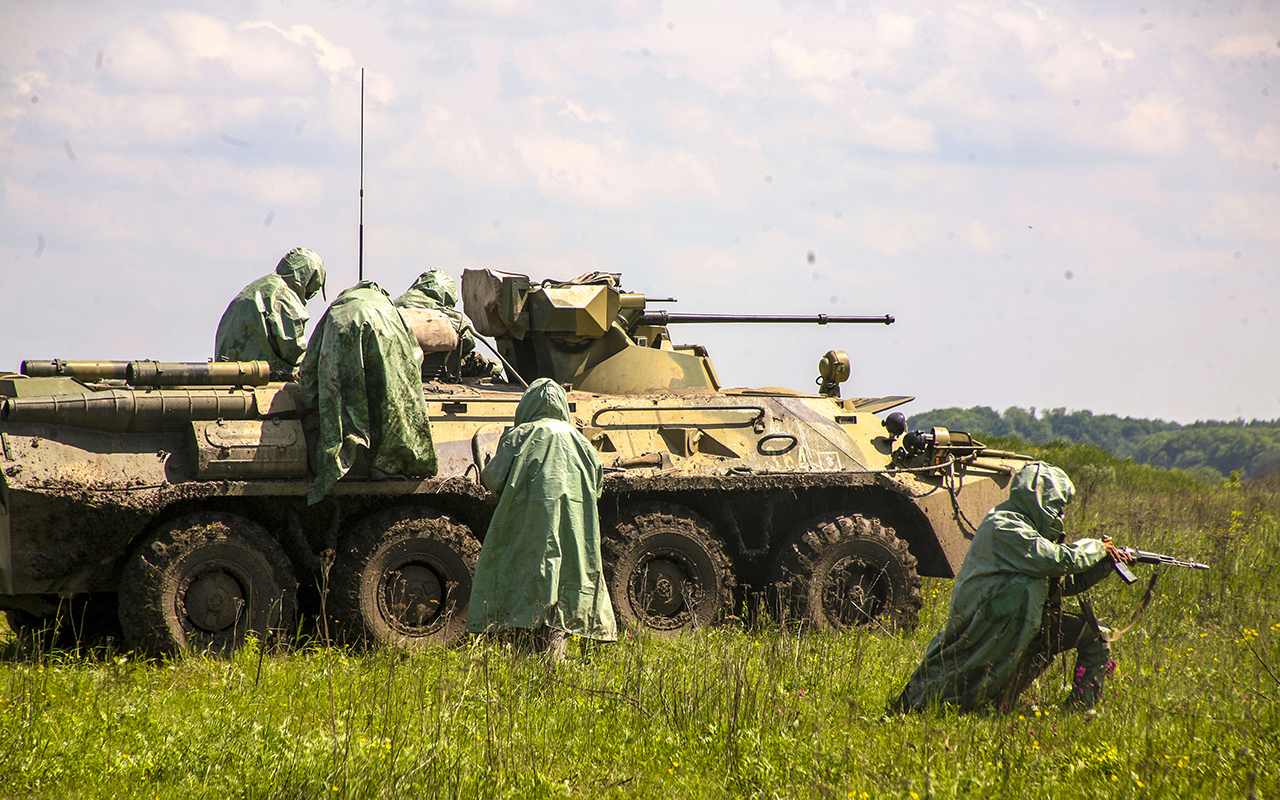
Of course, the RKhBZ would be involved in protecting Russian troops both against the NBC contaminants that they use, as well as those deployed by a potential enemy.
Accordingly, Ukrainian prosecutors charged Kirillov in absentia with the use of banned chemical weapons in Ukraine, only yesterday.
According to the SBU, there have been more than 4,800 cases of such weapons being used by Russia since the start of the full-scale invasion, leading to more than 2,000 Ukrainian service members being hospitalized.
In May of this year, the U.S. State Department determined that Russian forces had used chloropicrin — a toxic choking agent that has a disorientating effect — in Ukraine. This was “probably driven by Russian forces’ desire to dislodge Ukrainian forces from fortified positions and achieve tactical gains on the battlefield,” the State Department concluded.
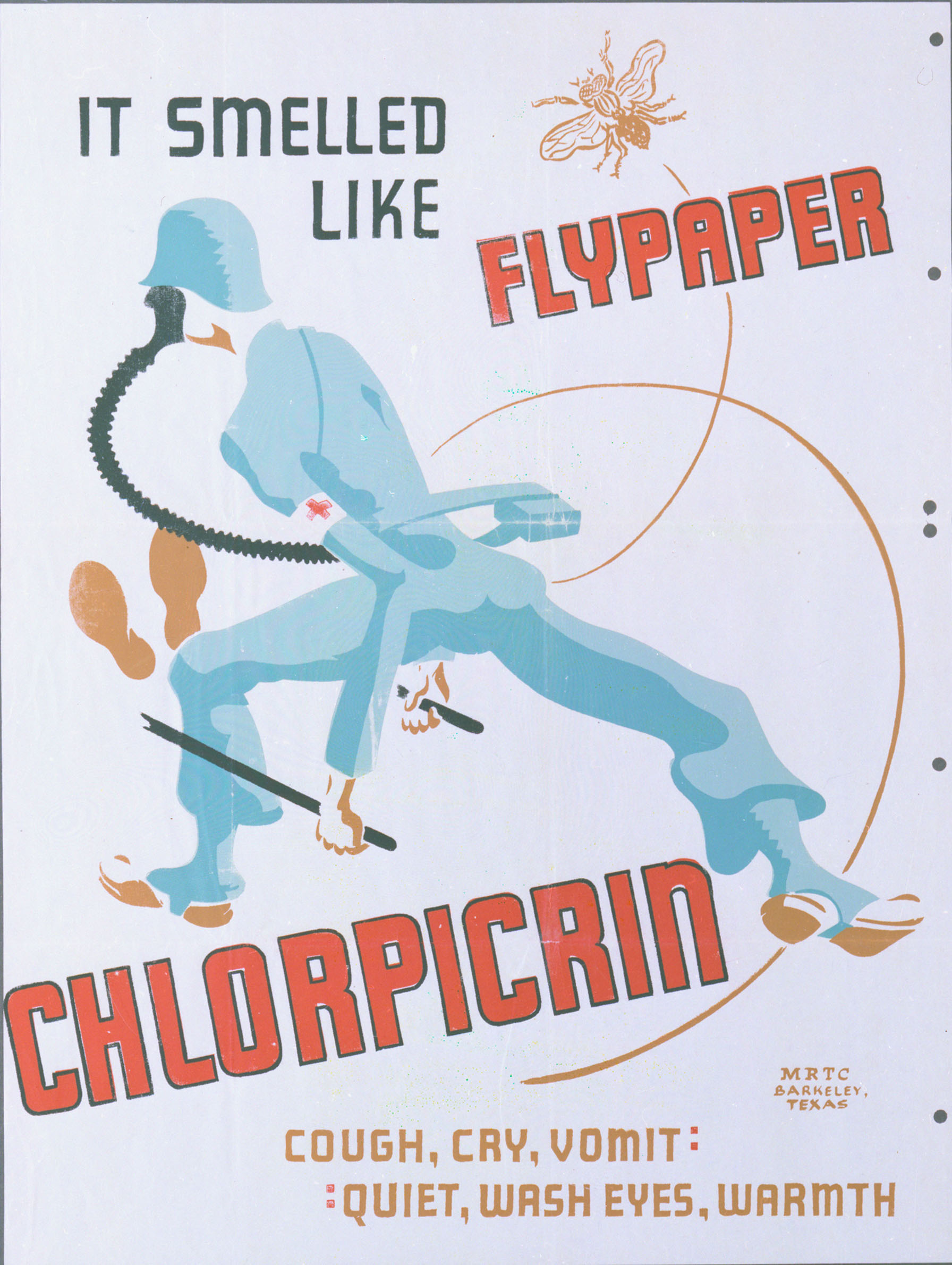
As we have discussed in the past, the exact definition of what constitutes a chemical weapon is complicated. However, chloropicrin is classified as a choking agent by the Organization for the Prohibition of Chemical Weapons (OPCW) and its battlefield use is expressly banned under the Chemical Weapons Convention (CWC), which Russia also signed.
In October, the United Kingdom put sanctions on Kirillov and the RKhBZ, in response to Russian forces’ use of chemical agents on the battlefield.
Russia has denied using chemical weapons.
Meanwhile, Russian claims also extend the blame for such violations to Kyiv’s Western allies, although no independently verified evidence of this has ever been presented.
Kirillov was also part of Russia’s attempts to rebuff Ukrainian claims that it had used chemical weapons in Ukraine. He appeared in the past on Russian state TV giving briefings, in which he accused Ukraine of violating nuclear safety protocols as well as implicating the West in various alleged crimes.
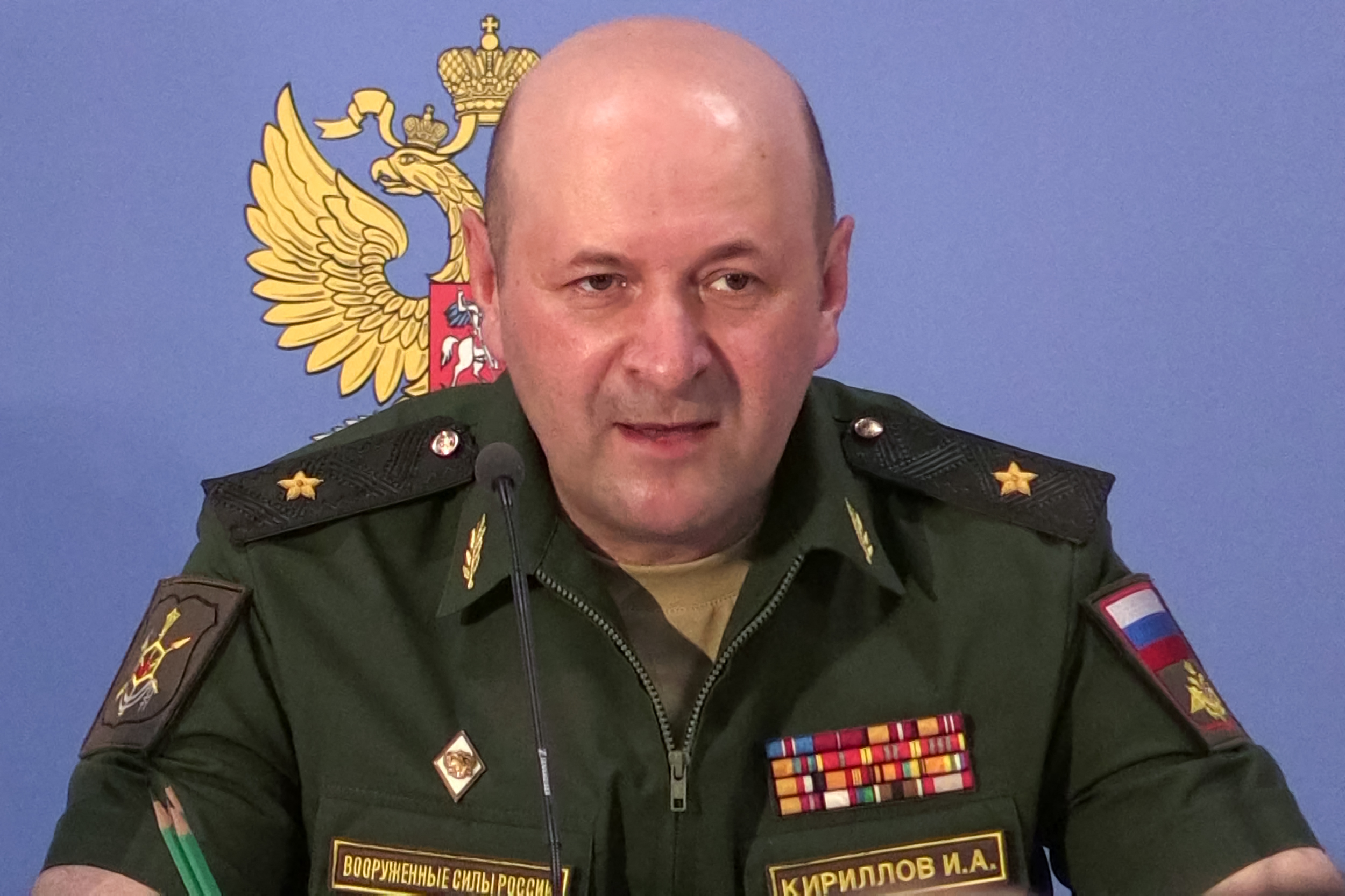
In a tribute to Kirillov, Maria Zakharova, a spokeswoman for Russia’s Foreign Ministry, said that he had worked “fearlessly” for “the Motherland” to expose what she said were the West’s chemical weapons-related and other crimes, including in Syria.
While Kirillov might well be the most senior Russian Armed Forces figure to have been assassinated since the start of the full-scale invasion of Ukraine, there have been a series of high-profile killings targeting, in particular, those who Kyiv considers guilty of war crimes.
In 2022, Darya Dugina, daughter of the Kremlin-linked far-right ideologue Alexander Dugin, was killed by a car bomb in the Moscow region.
In 2023, pro-war blogger Vladlen Tatarsky was killed when the St. Petersburg cafe he was in was bombed. Tatarsky, who was born in the Donbas region of Ukraine, and had fought with pro-Russian separatist forces, had become one of Russia’s most outspoken and ultranationalist military bloggers.
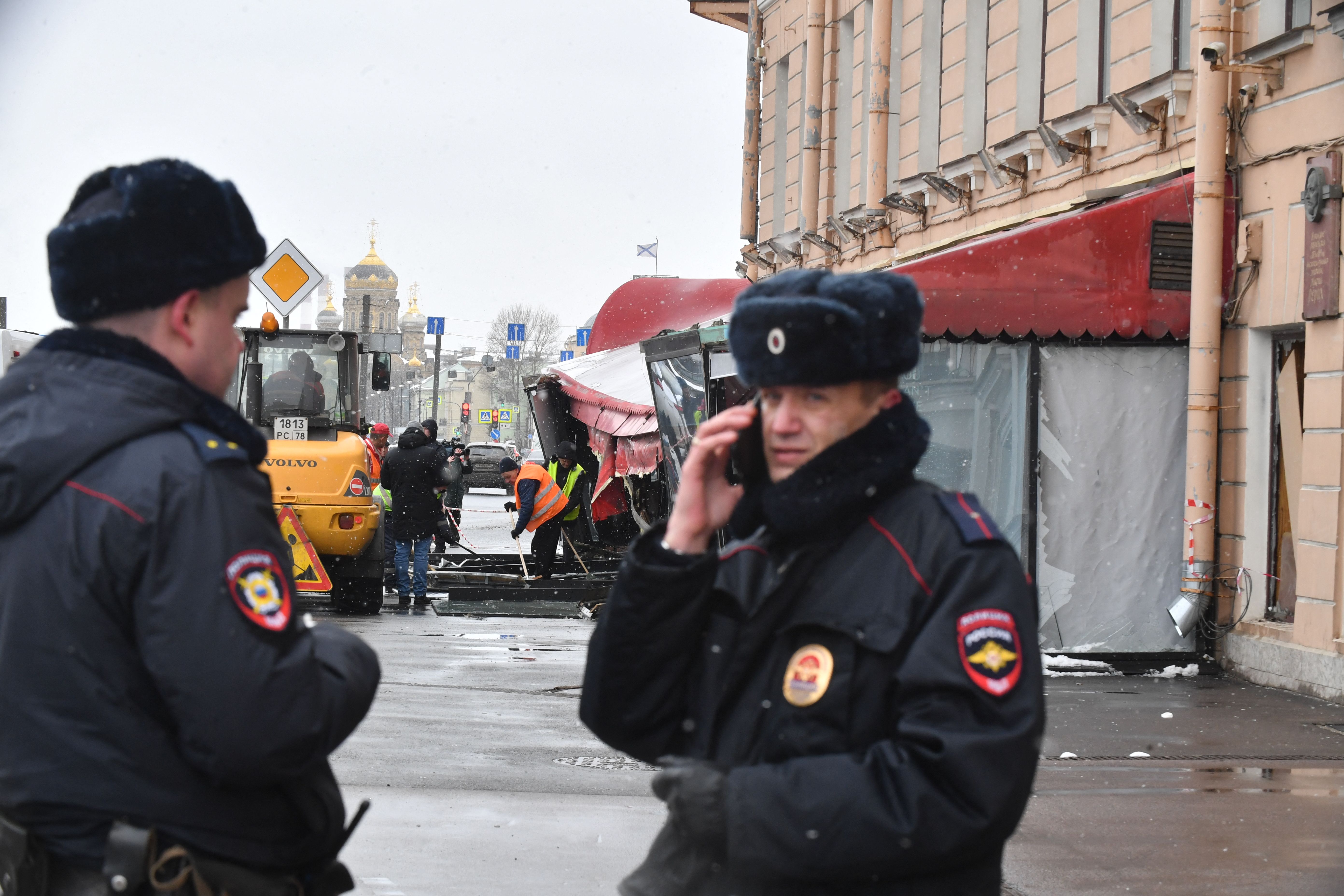
Also last year, Stanislav Rzhitsky, a Russian submarine commander, accused of war crimes by Ukraine, was shot dead while jogging in the southern Russian city of Krasnodar.
While Ukrainian authorities do not claim responsibility for all such assassinations, they have said that targeted killings are a legitimate tool in the war with Russia.
Russian promises of revenge for Kirillov’s killing are nothing new, of course, but the high-profile nature of this latest assassination may prompt other reactions from the Kremlin.
After all, the killing will likely have sent shock waves through the Russian Armed Forces leadership, in particular, raising questions about the safety of its senior officers, even on the relative safety of home soil.
A review of security protocols for leading Russian military personnel would seem to be an immediate priority.
“The killing of a lieutenant general will be a shock for many,” a former senior Russian defense official told The Guardian, speaking on conditions of anonymity. “This will definitely cause a stir,” the former official added.
Bolstering the security details assigned to figures like Kirillov would be one obvious response. However, relevant units of the Russian Armed Forces and internal security forces are already heavily engaged in Ukraine, with an ever-present threat of assassinations and sabotage in Russian-occupied areas.
For now, the assassination of Kirillov appears to be a win for Ukraine, which will see his elimination as justice for his involvement in the alleged use of banned chemical weapons. It is also perhaps the most powerful signal so far of the potential vulnerability of even the highest-ranking Russian military officers, wherever they might be. At the same time, it could result in a renewed focus by the Kremlin in targeting Ukrainian leadership.
Update, December 18:
Russia has detained a 29-year-old Uzbek citizen who investigators believe placed the explosives that killed Lt. Gen. Igor Kirillov in yesterday’s blast. The Russian state news agency TASS reported that the Uzbek man was working for Ukraine’s security service.
The man was arrested in the village of Chernoye in the Balashikha district of Moscow, according to the news agency RIA, citing Russian Interior Ministry spokeswoman Irina Volk.
The Russian Federal Security Service (FSB) claims the man was recruited by the SBU, which promised to pay him $100,000 and travel to a European Union country.
Contact the author: thomas@thewarzone.com
